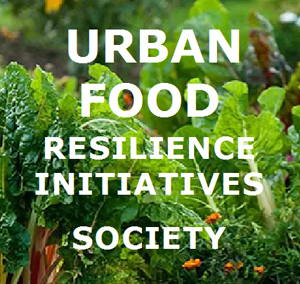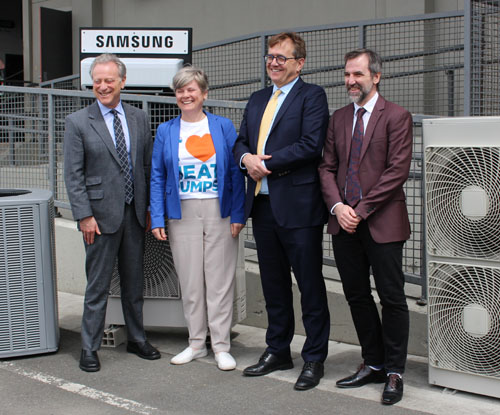
Monday May 13, 2024 | VICTORIA, BC [Updated 6:45 pm]
by Mary P Brooke | Island Social Trends
Helping reduce environmental impact from fossil fuels and lending a hand with affordability were addressed in a combo announcement by federal Environment and Climate Change Minister Steven Guilbeault in Victoria.
His announcement about a new heat pump subsidy program for homeowners comes with $103.7 million (from Canada’s Low Carbon Economy Fund (LCEF) and the Oil to Heat Pump Affordability (OHPA) program in support of BC’s $151 million toward this initiative.
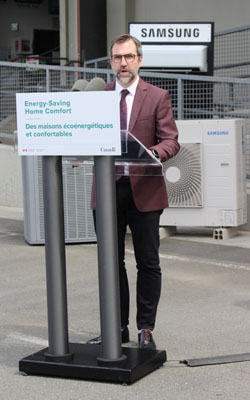
This program is aimed at helping low- and middle-income British Columbians reduce their energy costs. No money required up front; costs of an installation will be deducted from the invoice received from the installer.
Back in October 2023 BC Premier David Eby said that the federal heat pump rebate program should focus on people rather than a particular type of heating, and provide support across Canada.”
Local business backdrop:
The backdrop for today’s outdoor announcement was Refrigeration Supply, a business in an industrial section of downtown on Quesnel Street.
Guilbeault was joined by Jonathan Wilkinson, federal Minister of Energy and Natural Resources; Josie Osborne, Minister of Energy, Mines and Low Carbon Innovation; and George Heyman, Minister of Environment and Climate Change Strategy.
A local heat pump installation entrepreneur, Jordan Owen of RedBlue Heating & Refrigeration (based in Langford in the Greater Victoria west shore), also joined the politicians at the podium.
Most British Columbians are experiencing the costly impacts of more frequent and intense extreme weather events fuelled by climate change.
“Reducing pollution and making life more affordable while building a strong economy is how we can ensure a secure, healthy future for everyone,” it was stated in today’s news release from Environment and Climate Change.
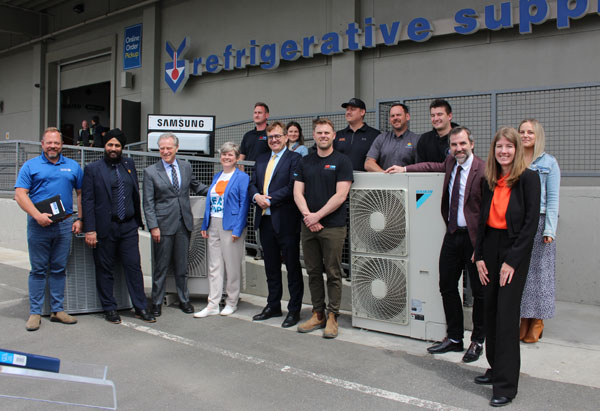
Oil, propane or natural gas:
Funding from Environment and Climate Change Canada and Natural Resources Canada will be used by British Columbia to provide grants to enable residents to switch their home heating systems from oil, propane, or natural gas to cleaner heating and cooling options.
Funding will also enable building upgrades for low- and middle-income homeowners and tenants through the CleanBC Better Homes Energy Savings Program, which aims to support low- and middle-income households installing heat pumps and reducing their energy bills.
Heat pumps also provide cooling in summer, protecting residents against extreme heat and replacing the need for separate air conditioners.
Renters are not directly supported in any way by this program. Osborne said today that a tenant might provide information about the program to their landlord.
Meets the moment:
Binding the message of affordability and climate change was today’s announcement theme. And it met with approval from Clean Energy Canada.
“Today’s announcement of up to $255 million in joint federal and provincial funding to help make heat pumps more accessible is such welcome news,” said Evan Privick, manager of the clean energy program with Clean Energy Canada, in a news statement this afternoon.
He noted the cooling function of heat pumps for comfort in hotter weather as well as heating in cold weather.
“Fighting the causes of climate change, helping people adapt to the impacts of climate change, and improving household affordability are each mountainous undertakings,” said Privick, adding that “BC is making progress on all of the above”.

While the program is welcome, NDP MP Laurel Collins (Victoria) — who attended the noon-hour announcement — said the announcement made today was “long overdue”. She added that “Canadians shouldn’t be expected to bear the cost of the climate crisis alone”.
Striking a balance:
Today Island Social Trends asked the federal environment minister about the interplay of Canadians with government efforts to achieve effective responses to climate change.
Guilbeault said in response that the federal government is trying “to ensure that we have this right balance” and that “you can strive to achieve it”. He said that it’s important to make sure”that all sectors of Canadian society are doing their fair share” or that they “aim to”.
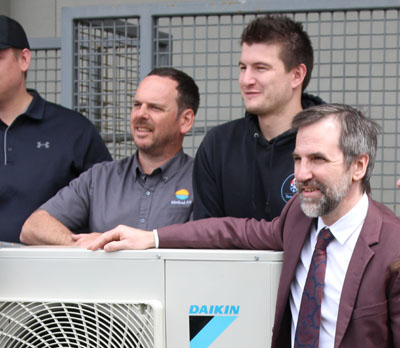
He pointed out that most of the federal government’s measures are aimed at larger emitters of greenhouse gases” such as regulating methane emissions in the oil and gas sector, clean fuel standards for refineries, zero emission vehicle standards for car companies,
“Citizens have a role to play. We’re trying to help people with programs like these and others to make the transition to help contribute to Canada’s goal of fighting climate change,” said Guilbeault today.
Rebate for heat pump installation and electrical upgrade:
As part of the Oil to Heat Pump Affordability program, low- and middle-income applicants could receive a rebate of up to $16,000 to switch to high-efficiency heat pumps in homes currently heated with oil. With the support of the Low Carbon Economy Fund, these changes will also apply to homes heated with natural gas and propane. This is an increase in support of approximately 70 percent from British Columbia’s existing rebate program.
Those who are eligible and living in northern British Columbia can access up to an additional $3,000 toward the installation of a heat pump.
Homes that require an electrical system upgrade can also qualify for a rebate of up to $5,000 to complete this work.
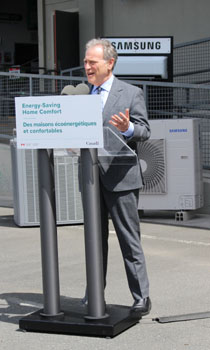
The funding announced today could help low- and middle-income applicants receive a total of up to $24,000 to cover the costs of a heat pump installation, including electrical upgrades. In addition to these increased rebates, successful Oil to Heat Pump Affordability applicants who make the switch from oil heating to an electric heat pump will also receive an upfront, one-time payment of $250 from the Government of Canada.
The CleanBC Better Homes Energy Savings Program also provides funding for home upgrades, such as the installation of energy-efficient windows and doors, insulation, and ventilation.
These programs will build a clean economy by facilitating 16,000 retrofits in low- and middle-income households, which are expected to reduce more than 40,000 tonnes of carbon dioxide equivalent in 2030—about the same as removing over 12,000 passenger vehicles from the road—and create over 900 full-time jobs. At the same time, the programs will improve affordability by improving energy efficiency and lowering monthly utility costs. Households that switch from fossil fuels to electric heat pumps for space heating can see energy savings of up to 80 percent.
Proven year-round technology:
Heat pumps are a proven technology in Canada, capable of providing year-round comfort control for a home by heating it in the winter, cooling it in the summer (heat pumps, despite their name, can also act as air conditioners), and in some cases, heating water.
Program timeline:
The Oil to Heat Pump Affordability program was first introduced in November 2022 as a $250 million investment in a new stream within the Canada Greener Homes Initiative.
On February 22, 2023, the program was opened to pre-registration and was fully launched in late March 2023, with the first grants being issued shortly thereafter.
The program was already in place with Newfoundland and Labrador, Nova Scotia, and Prince Edward Island and now BC is included.
So far, the Oil to Heat Pump Affordability program has received nearly 14,000 applications to date nationally.
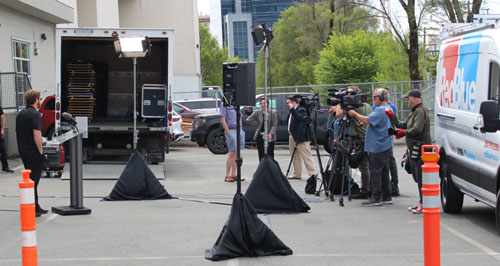
Heat pump popularity:
The number of households in British Columbia with heat pumps has increased by approximately 80 percent since 2017, from an estimated 142,000 to 254,000.
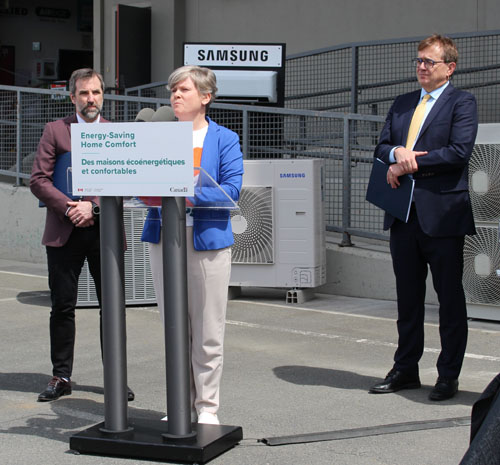
In 2022, for the first time ever, the number of heat pumps shipped to British Columbia (37,800) exceeded the number of natural gas furnaces shipped to British Columbia (30,700).
The goal is 2050:
Initiatives such as those announced today put Canada on the right path to making life more affordable and achieving net-zero emissions by 2050.
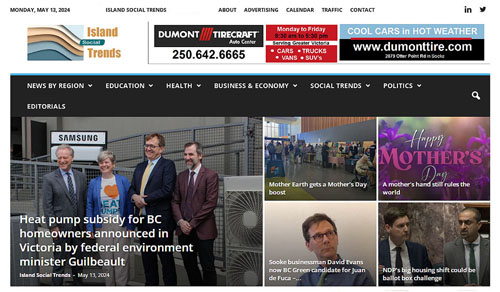
===== RELATED:
BC Premier pushes heat pumps at COF in Halifax (November 6, 2023)
BC Premier: do heat pump rebate across Canada (October 30, 2023)
NEWS SECTIONS: ENVIRONMENT & SUSTAINABILITY
===== GOVERNMENT LINKS:





